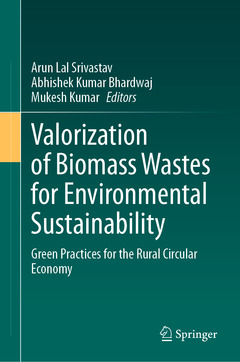Description
Valorization of Biomass Wastes for Environmental Sustainability, 2024
Green Practices for the Rural Circular Economy
Coordinators: Srivastav Arun Lal, Bhardwaj Abhishek Kumar, Kumar Mukesh
Language: English
Subjects for Valorization of Biomass Wastes for Environmental...:
337 p. · 15.5x23.5 cm · Hardback
Description
/li>Contents
/li>Biography
/li>Comment
/li>
This volume discusses the reduction, recycling, and reuse of industrial and agricultural biomass wastes to develop value-added products using environmentally sustainable practices and technologies. Through these waste valorization approaches, biomass waste materials can be converted into useful bio-chemical products, sustainable construction materials, polymers, bio-energy, and bio-fuel as sustainable alternatives to products and materials with negative environmental and health consequences. The chapters highlight the development and implementation of eco-friendly solutions to biomass waste production with the aim of reducing natural resource deterioration, bolstering rural and small-scale business systems in communities impacted by pollution and climate change, and providing power from residual biomass to broadly reduce environmental impacts through improved waste management practices. The book is intended to be a useful resource for researchers, policymakers, NGOs, government agencies, and local community authorities working in waste management and environmental sustainability.
Chapter 1: Biomass waste is a boon or bane for society: A comprehensive analysis.- Chapter 2: Approach to reducing agricultural waste via sustainable agriculture practices.- Chapter 3: Biomass waste and bio-energy production: Challenges and alternatives.- Chapter 4: Enzyme-Mediated Strategies for Effective Management and Valorization of Biomass Waste. Chapter 5: Nanotechnological advancements for enhancing lignocellulosic biomass valorization.- Chapter 6: A state of art of biofuels production using biomass wastes: Future perspectives.- Chapter 7: Role of pre-treatment approaches to generate value-added products using agriculture biomass.- Chapter 8: Utilizing Biomass-Derived Composites in 3D Printing to Develop Eco-friendly Environment.- Chapter 9: Bioenergy production using biomass wastes: Challenges of circular economy.- Chapter 10: Application of enzymes in biomass waste management.- Chapter 11: Pre-treatment techniques for derivation of value-added products from agro-wastebiomass.- Chapter 12: Significance of enzymatic actions in biomass waste management: Challenges and future scope. Chapter 13: Bioeconomy: A Sustainable Approach for Biomass Waste Management.- Chapter 14: Application of Flower Wastes to Produce Valuable Products.- Chapter 15: Myco-degradation of Lignocellulosic waste biomass and their applications.- Chapter 16: Value added product development utilizing the food wastes.- Chapter 17: Role of bacterial degradation in Lignocellulosic Biomass for biofuel production.- Chapter 18: Cultivating a Greener Tomorrow: Sustainable Agriculture Strategies for Minimizing Agricultural Waste.
Dr Arun Lal Srivastav is working as Associate Professor at Chitkara University School of Engineering and Technology, Chitkara University, Solan, Himachal Pradesh, India. He has obtained his PhD from the Indian Institute of Technology (BHU), Varanasi, India on the adsorption of nitrate and fluoride from water. Also, he has done post-doctoral research at National Chung Hsing University, Taiwan. He is currently involved in the teaching of Environmental Science, Environmental Engineering, Disaster Management and Design Thinking to the undergraduate engineering students. His research interest includes water quality surveillance, climate change, water treatment, river ecosystem, soil health maintenance, engineering education, phytoremediation and waste management. He has published 82research papers in various prestigious journals (Elsevier, Springer, IWA, Taylor & Francis etc.) including some book chapters and conferences. He is also editing 17 books with the Elsevier, Springer, IGI Global, NOVA and Wiley. Additionally, he is also one of the series editors of Elsevier and Nova publisher on energy sustainability and e-waste management, respectively.
Dr. Abhishek Kumar Bhardwaj is working as Assistant Professor at Amity School of Life Sciences, Department of Environmental Science, Amity University, Gwalior, (MP) India-474001. He has obtained his PhD from the Central University of Allahabad, Pryagraj on the Drinking water disinfection using green synthesize metal nanoparticles. He has also done Post-doctoral research from Department of Environmental Science, VBS Purvanchal University, Jaunpur (India). Currently, He also has the responsibility of teaching, Postgraduate students of Environmental Science and also involved in university administrative work like a various program organizer, assistant superintendent of examination and others. His research interest includes green synthesis of nanomaterials for water purification, Bio-sensing, Nanobase device fabrication,w




